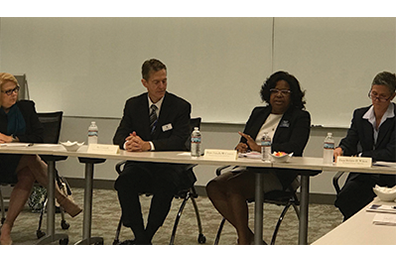HOW CAN LAW SCHOOL DEANS PROMOTE EQUITY AND INCLUSIVENESS?
by Danielle M. Conway, Dean and Donald J. Farage Professor of Law
September 2, 2019 — Law deans across the nation and, yes, around the globe consider it their collective mission to promote equity and inclusiveness in the legal academy and in the legal profession. Among the overwhelming majority of this group, this is neither a high-minded ideal nor an intellectual talking point; instead, and I feel comfortable speaking for my dean colleagues, this is a worthy aspiration that will positively impact how the rule of law is viewed among all members of society. My confidence in making such a bold statement is bolstered by the ongoing conversations that I routinely engage in with amazing colleagues who represents myriad segments of our society, all committed to fairness as a universal principle.

Two of these gatherings facilitating these conversations occurred this summer. The Women’s Leadership in Legal Academia Conference convened on July 18-19, 2019 at the University of Virginia School of Law and, closer to home, the Eighth Annual Promoting Diversity in Law School Leadership convened on August 12-13 at Villanova University Charles Widger School of Law. As an African-American woman, I was proud to represent Penn State Dickinson Law at both by speaking on and contributing to panels addressing (1) overcoming gender and racial stereotypes in law school leadership, (2) identifying challenges and opportunities in law school leadership, (3) navigating gender, race, and new media, and (4) developing strategies for setting institutional priorities and managing budgets and finances.
The overarching purpose of these conferences is to introduce the idea to women and people of color that they too have a contribution to make as leaders in law school. The most important objective I had in attending and participating in these important gatherings was to model successful leadership. And to be clear, modeling successful leadership does not mean sharing only what works; it means sharing “negative know-how” gained as a result of experiences with challenges having no readily available solutions. My goal for participation was to share that leaders are the people who step up to their service obligations selflessly and resolutely to contribute to solving seemingly intractable problems. While I believe I met my goal; as always, when surrounded by smart, engaging, personable, and authentic people who are genuinely committed to advancing legal education as the next generation of law school leaders, I feel as though I was given more than I gave.